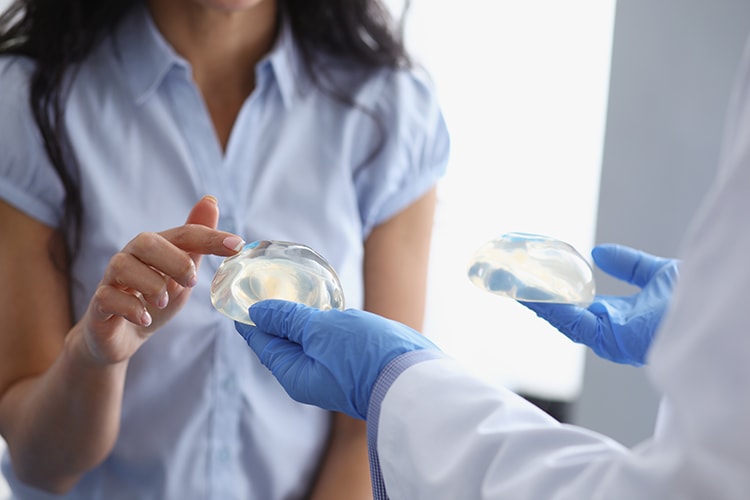One of the most common plastic surgery procedures performed in the US every year is breast augmentation. There are about 10 to 15 million women worldwide with breast implants, most who have had them for decades with no problems. But since they are not considered lifetime devices, they should be monitored periodically for several potential problems.
At Aesthetic Plastic Surgery, board-certified plastic surgeon Gene Sloan, MD regularly performs breast augmentation surgery to help his patients achieve their desired appearance. In addition to educating his patients on different implant types, he strives to help them understand any potential risks and complications that may arise from breast implants.
Below, Dr. Sloan highlights different breast implant issues to screen for:
Silicone Gel-Filled Implant Rupture
Silicone gel-filled breast implants can rupture due to normal wear of the shell; however, the implant does not go flat as the silicone gel is not absorbed by the body. Since there may be no other symptoms or only subtle physical findings, these are called silent ruptures. Silicone gel implant rupture may be diagnosed by physical exam, ultrasound, or MRI.
We now offer in-office ultrasound using our handheld Clarius ultrasound and bluetooth technology to help identify rupture. Breast implant rupture is typically covered by the implant warranty, which often varies depending on the age of the implant. Ruptured silicone gel implants require additional surgery for replacement.
Saline-Filled Implant Deflation
Saline-filled breast implants deflate and go flat when the solution leaks out through a damaged valve or a break in the implant shell due to normal wear. Oftentimes, this event is covered by the implant warranty and requires additional surgery to replace or remove the implant.
Capsular Contracture
Capsular contracture refers to when the scar tissue that normally forms around the implant can thicken and contract, squeezing the implant and making the breast implant feel firm. It can cause firmness, distortion, displacement of the implant, asymmetry, and pain. Early contracture may be treated with medication, but if it is identified later, it often requires surgery to replace the implant and remove the scar tissue capsule. A risk factor for implant infection is bacterial contamination or infection elsewhere in the body, which can travel through the bloodstream to the implant. Bacteria in the bloodstream is more common than one might think and can occur from common experiences and activities, such as a bladder infection, mastitis, piercings, tattoos, or dental work. We recommend taking antibiotics for these procedures.
Implant Wrinkling
All breast implants wrinkle to some degree. Sometimes it is felt and sometimes it is visible. Risk factors that increase the degree of wrinkling are thin tissue, saline implants, and textured surfaces. Patients with extremely thin breast and chest tissues, very little body fat, or stretch marks are at higher risk of wrinkling.
Pain
Breast pain is one of the most common symptoms evaluated after patients have had implants for several years. A majority of the time, the pain is due to fibrocystic changes of the breast tissue and not an implant problem at all. Breast pain caused by the implant is typically associated with another one of the conditions listed here. Pain associated with significant swelling should be evaluated promptly.
Infection
Breast implant infections are rare. The infection rate occurring in the first month is 1 in 300, and after that less than 1 in 1,000. Sometimes the infection is the breast itself and other times the implant. An implant infection is almost always treated with implant removal in addition to antibiotics. If an implant infection requires removal of the implant, both implants can be removed and may be replaced a few months later.
Breast Implant-Associated Anaplastic Large Cell Lymphoma (BIA-ALCL)
BIA-ALCL is an extremely rare type of lymphoma that has been associated with textured breast implants and caused one manufacturer’s implant to be pulled off the market. As of May 2024, there have been 1,566 cases reported worldwide. BIA-ALCL is not a cancer of the breast tissue itself and when diagnosed early, it is readily curable. If the disease is advanced, chemotherapy or radiation may be required. It has not been associated with smooth surface implants.
Breast Implant Illness (BII)
BII is a term used to describe a variety of symptoms which may include fatigue, joint pain, hair loss, headaches, chills, photosensitivity, chronic pain, rash, body odor, anxiety, brain fog, sleep disturbance, depression, neurologic issues and hormonal issues. These are believed to be the result of saline or silicone, textured or smooth breast implants. Contrary to what is found on social media, most plastic surgeons do believe BII exists, and it is supported by the plastic surgery literature. While some women benefit from implant removal, some do not. A small percentage of women eventually replace the implants with new ones.
Breast Cancer
Published studies indicate that breast cancer occurs less frequently in women with implants than in those without implants. It is recommended that all women perform periodic self examinations of their breasts, have mammography according to American Cancer Society Guidelines, and seek professional care should they notice a breast lump.
Breast implants are not considered lifetime devices. You may need more surgery and doctor visits over your lifetime. Even though implants are often covered by a lifetime replacement policy, you may require additional expenses related to future implant surgery. The FDA recommends that even if you have no symptoms, you should have your first ultrasound or MRI five to six years after your initial implant surgery and then every two to three years thereafter.
If you think you are experiencing a problem with your implants, are interested in removing or replacing implants, or would like to schedule a consultation with Dr. Sloan, please contact our office today.


